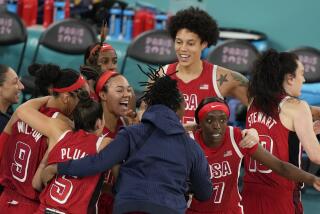A Pixie Catches Gold Bug
- Share via
It was Mary Lou Retton Day at Pauley Pavilion, and around the world, for that matter. Ecaterina Szabo of Romania was supposed to be the class of the women’s gymnastics field, but Retton took the prestigious all-around event by five-hundredths of a point.
Of Retton, The Times’ Richard Hoffer wrote: “She’s a calculating coquette. You give her a chance, she’ll steal your heart. She is a shrewd, brown-eyed gold digger.”
Szabo had started with a perfect 10 on the balance beam, but Retton waited for her best events, which came at the end of the schedule, and cashed in.
Retton’s coach, Bela Karoyli, was so excited when the final results were posted that he went on a hugging spree, starting with whomever was nearby. In this case, it was The Times’ Rick Reilly, who later did a play by play of the hug.
“He said, ‘Yawooooo,’ ” Reilly said. “And I said, ‘Gmmphmph,’ which is the only literate thing I can manage with my lungs collapsed.”
On a day when American swimmers were dominating again, with gold medals going to Mary T. Meagher, Rick Carey, Tiffany Cohen and Tracy Caulkins, a strange thing happened at the USC pool. An Australian butterfly swimmer named Jon Sieben, who was going up against the fabled West German albatross, Michael Gross, was laboring away in Lane 6 in the 200-meter final. While all eyes were on Gross and his competitors in the normally faster lanes in the middle, Sieben was slipping past them and getting to the wall first. Not only was this a huge upset, but Sieben’s world-record time of 1 minute 57.04 seconds was four seconds faster than any time he had ever achieved in the event prior to his 1:59.63 in the morning preliminaries.
Another swimmer, Nancy Hogshead, who had won yet another gold medal in a relay, was regaling the press about having to live with the name Hogshead. She said her father told her that it would make her stronger, but she said she wasn’t sure about that. She said that other names had come her way, such as “Nancy Pigsfeet.” But she said the worst time was when she signed in at a doctor’s office and the receptionist, reading the name, was laughing so hard she had to leave the room.
Edwin Moses got through the preliminaries of the 400-meter hurdles with a victory that brought his streak to 103, including all heats and finals. Mary Decker, a week away from her attempt at a gold medal in the women’s 3,000, had won a 2,000-meter race in Eugene, Ore. In doing so, she had broken the world record, then held by a South African who would run for England against Decker in the 5,000. Her name was Zola Budd.
Attendance for all Olympic events for the first five days was announced as 1,580,928, and the medal count showed clearly what a red, white and blue athletic romp this had become: USA 52, second-place West Germany 22. Gold medals: USA 29, second-place China 8.
The French men’s basketball team was struggling. After an 0-3 start, the French coach had suspended three of his players. That was the day before his team had to play the United States, a game France lost, 120-62. When the same French coach saw American reporters filing into the postgame news conference, he accused them of being “vultures.”
More to Read
Go beyond the scoreboard
Get the latest on L.A.'s teams in the daily Sports Report newsletter.
You may occasionally receive promotional content from the Los Angeles Times.







